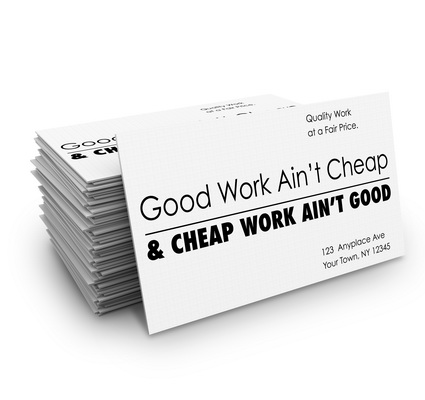I recently advised a lawyer who was exasperated from a conversation with a potential client. “This guy kept comparing us to Legal Zoom!” he told me. “How can he compare the customized service of our highly-skilled legal team to a one-size-fits-all template downloaded from a website?”

What cheap (or free!) alternatives do you face in your business?
Today I will show you how to handle these prospects, how to win over as many as possible, and when to just walk away. To know how to handle these prospects, you have to understand the three personality types they fall in.
Type 1: Prospect Just Needs Reassurance
These clients are basically sold on using you, but they just need a little reassurance before the sign the contract. When the question about the cheap alternative doesn’t come up until late in the sales process, it is a good sign that you will be able to close this person. They are likely asking the question out of nerves before committing. Or perhaps they are hoping to get a bit of a discount from you. Either way, you just need to reassure them they are making a good choice. Restate the benefits of working with you, and how you will get them the results they want. This is the reassurance they need to sign the contract.
Type 2: Prospect is Legitimately Trying to Compare
These clients don’t understand your industry well, and they are honestly just trying to understand which is the best route for them. No matter how outlandish their questions, be careful not to be offended. Just teach them the differences between you and the cheap alternative. An advanced technique is to actually talk up why that alternative might be a great choice, in certain situations.
I was recently interviewing a DJ for my wedding. I told him I was thinking about just using an iPhone playlist and not having a DJ at all. He shocked me by agreeing that that might be a wise decision, and he explained the circumstances where the iPod would be a wise choice. He then explained how, in certain other situations, a DJ would be a better choice. By doing this, he helped me see that I was clearly in the second group. Now I was eager to invest in hiring him, free of any second-guessing about using an iPhone.
Type 3: Prospect is Not Really a Prospect
Nothing you can say will make this type of prospect hire you. This is the case because either (1) they simply don’t have the budget, or (2) their needs are not complex enough to justify a professional of your caliber. Warning: They still may try to spend hours of your time asking you to justify your fees. It’s your job to root these people out quickly, so you don’t waste your time.
A good sign that you’re talking to this type of prospect is that, when asking about the cheap alternative, their questions have an undertone of shock or even hostility. This person is stunned that you would charge SO much more than the cheap alternative. Their mind is not open, and you will not win their business. If, on the other hand, the person’s questions demonstrate a respect for your professional qualifications, they are more likely a Type 2.
[margin20]
Take the Long-Term Approach
If you have a lot of prospects who end up not being a fit, don’t despair. These people are a resource to be mined in the future.
I have many people approach me who aren’t ready to invest in working with me… both Type 2 and Type 3. I stay in touch with them (typically by inviting them to join my email newsletter), and a percentage of them end up becoming clients down the line. It may be years later that they come back to me, but some inevitably do. Now they have the money, or their priorities have evolved, or the complexity of their situation has increased. And they (finally) become a client.
[margin20]
Share Your Thoughts
What are the cheap alternatives you face in your business? What have you found effective at closing or turning away prospects who are asking about that? Please share your wisdom with me by posting a comment below.